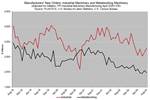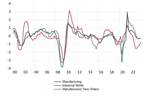Industry Report: Automotive Outlook, Forecast, Disruptions and Industry Transitions
A recent presentation by Auto Forecast Solutions shares some interesting trends to help those who work within the automotive industry better understand key trends.

The June 2024 AutoForecast Solutions Automotive Outlook presentation, delivered at the APMA Annual Conference, offers some valuable insights on current trends and future predictions in the automotive industry. Here are some key takeaways from the presentation:
1. Economic Landscape
- The global economic landscape is showing signs of recovery, with growth expected across major markets.
- The automotive industry is experiencing shifts in consumer preferences, driven by sustainability and technological advancements.
- Key trends include the rise of electric vehicles (EVs), increased investments in autonomous driving technologies, and the growing importance of supply chain resilience.
2. Automotive Market Forecasts
- Vehicle production is anticipated to rise steadily, with a focus on greener and more efficient models.
- The EV market is projected to expand significantly, supported by government incentives and infrastructure developments.
- Traditional internal combustion engine (ICE) vehicles will see a decline in market share, although they will remain relevant in certain regions.

Global shift to xEV strategy to bridge future BEV growth. Source: AutoForecast Solutions
3. Technological Innovations
- Advances in battery technology are crucial for the growth of the EV sector, with improvements in energy density and charging speeds.
- Autonomous driving technologies are progressing, with Level 4 and Level 5 autonomy becoming more feasible.
- Connectivity and digitalization are transforming vehicles into smart, interconnected devices, enhancing the driving experience and safety.
4. Supply Chain Challenges and Solutions

- The pandemic highlighted vulnerabilities in global supply chains, leading to a renewed focus on localization and diversification.
- The semiconductor shortage remains a critical issue, necessitating strategic partnerships and investments in domestic production capabilities.
- Sustainability is driving changes in supply chain practices, with an emphasis on reducing carbon footprints and adopting circular economy principles.
5. Policy and Regulatory Environment
- Governments worldwide are implementing policies to accelerate the transition to sustainable transportation.
- Emission regulations are becoming stricter, pushing automakers to innovate and comply with new standards.
- Trade policies and tariffs continue to impact the industry, requiring companies to navigate complex geopolitical landscapes.
6. Strategic Recommendations
- Automakers should prioritize investments in EVs and autonomous technologies to stay competitive.
- Building resilient and flexible supply chains is essential for mitigating future disruptions.
- Collaborating with technology providers and leveraging data analytics can drive innovation and efficiency.
- Embracing sustainability initiatives will not only meet regulatory requirements but also align with consumer expectations and corporate social responsibility goals.
Related Content
-
Project Reveals Added Benefits of New P20 Grade Steel in Machinability, Cycle Time and No Stress Relief
MoldMaking Technology's Christina Fuges talks with General Motors' Shane Appel about a project testing a new P20 steel grade's dimensional stability.
-
Specialist Automotive Mold Builder Mentors in Work and Life Skills
Southeastern mold builder PFAFF Molds sets the standard in toolmaking for automotive window and vehicle body sealing systems through knowledge-sharing and automation.
-
Hot Runner Technologies Advance Quality Surface Requirements in Automotive
Oerlikon HRSflow hot runner systems combine cost-efficient production with a precise process control for a variety of automotive applications.














